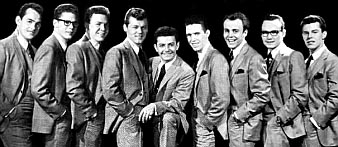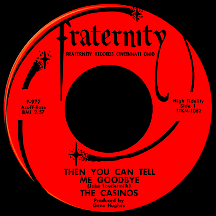THE CASINOS
Then You Can Tell Me Goodbye
The Cincinnati group led by Gene Hughes had more than a dozen members over the course of its heyday, gave a couple of monikers a whirl before settling on The Casinos, and had records released by several different companies over a period of more than a dozen years. For all their trouble they managed one major hit, "Then You Can Tell Me Goodbye," in 1967. An impossibly romantic ballad ('Kiss me each morning for a million years...') by prolific Carolina songwriter John D. Loudermilk, it appeared on Verve as a pop/country tune by Don Cherry in 1962; other early attempts at popularizing the song included a more youth-friendly rendition by Johnny Nash on Argo in 1964, landing midway through the long, trying stretch between Nash's successful late '50s and late '60s periods. The song wasn't a hit right away but was destined to thrive and, despite sounding dated by '67 standards, the brass- and organ-soaked Casinos recording finally put Hughes and company on the far-flung musical map.
Gene and his brothers Glenn and Norman grew up fascinated with street corner harmonies; in the late '50s Gene was in a group called both The Legends and The Capris before switching to Casinos after becoming aware of two other Capris groups (the R&B combo on Gotham and Planet Records' "There's a Moon Out Tonight" guys). There were other Casinos groups around the country too, but none of them were any better known at the time than this Ohio outfit that included singers Joe Patterson, Roger West, Marc Brown and singer-guitarist Ray White. Gene Hughes spent two years in the Army, during which time J.T. Sears stepped in as lead; his was the voice heard on the group's first single, "Do You Recall," a doo wop ballad released on the regional Name label.
Gene reclaimed his spot when his service ended; other members came and went including Pete Bolton, Jack Kennedy and Ken Brady, yet through 1964 the only records released were reissues of "Do You Recall" on the Olimpic and Itzy labels with the vocal by Sears, who had by that time died in an auto accident. The band had developed a tighter, more contemporary sound, resulting in two singles on the Terry label with Kenny Smith's arrangements, the uptempo "That's the Way" the best of the four sides. A bigger break came from closer to home; Harry Carlson's Cincinnati-based Fraternity Records, already in business for a decade with several big hits to its credit, signed the Casinos in '65. Debut disc "She's Out of Sight," featuring Fraternity artist Lonnie Mack on guitar, showed hit potential but only clicked in Cincy and a few midwest cities.

After a follow-up single, Carlson put the band on hold for more than a year, finally taking another chance in late '66 with "Then You Can Tell Me Goodbye." It broke into the national charts in January '67 and rose quickly, hitting the top ten at the end of February. By then the group had ballooned into a nine-piece, all-purpose band (guitar, bass, organ, sax, trumpet, trombone) with permanent lead singer Gene and his brother Glenn in addition to Patterson, White, Bolton, Bob Armstrong, Tom Mathews, Mickey Denton and Bill Hawkins, all sharply-dressed, bucking the current long-hair trend per Gene's preference and insistence that the clean-cut look was making a comeback. The next single, "It's All Over," a Phil Everly composition that had just gone top ten in England for Cliff Richard, received tender treatment by the Casinos, but disappointingly spent just a few weeks on the national charts in April and May. "How Long Has it Been" received airplay in Ohio and a few other areas in June.
Gene Hughes put out a solo Fraternity single, "Peggy," followed by two more Casinos 45s. They left for United Artists in 1968, billed as Gene Hughes and the Casinos on a pair of singles, then returned to Fraternity as the Casinos for a few more between 1969 and '71. One single for the Million label came out in '72; the group stuck to performing live for several years, then a final record on the Carol label came around 1980 (by this time most of the guys had scattered, leaving only Gene and a newer assemblage making the rounds under the Hughes/Casinos billing that had been used on UA. Later, Hughes worked as a promotional rep for MCA Records. "Then You Can Tell Me Goodbye" had a life beyond the Casinos' definitive version: Eddy Arnold covered it and hit number one on the country charts in October 1968, Glen Campbell's medley of the song (with "Don't Pull Your Love") brought it back to the top 40 in '76 and San Antonio group Toby Beau revived it yet again in 1979.


